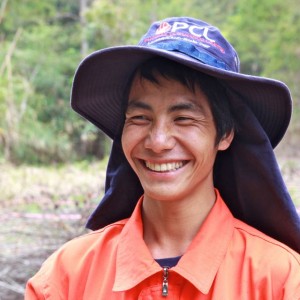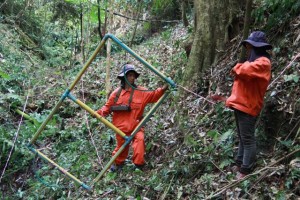Project Sekong 2012: Meet our team. Chan Mai Vue, Hmong deminer from Bolikhamxai. Hard worker. Big eater.

Chan Mai Vue is ethnic Hmong, from a province in central Laos. He is new to our team but has proven to be cheerful, honest and hard-working. He is fluent in both Hmong and Lao. His language skills will be helpful if our project moves to a northern province where Hmong villages are plentiful.
Report 31
Chan Mai Vue, the younger of our two Hmong deminers, lives in Bolikhamxai Province, in south central Laos. That’s not a region that people commonly associate with the Hmong, but there have been Hmong settlements there for generations. In fact, I made my first visit to that province on a mission to find the extended family of one of my Hmong-American students in Wisconsin — a case in which most of a family fled Laos and made their way to America while other relatives, less fortunate or less daring, remained behind.
Chan Mai is twenty-five years old and, for now, unmarried. He makes daily phone calls to someone whose name he won’t share. When we ask who’s on the phone, he blushes, grins and identifies the caller as family. We all read him like a book, know it’s a girlfriend, but keep pestering him just to watch him squirm. (Such is our limited entertainment in camp!)
I always ask the deminers what they do with the pay that they earn from working for our project. Usually, I teasingly accuse the guys of drinking or gambling their money away. In truth, the guys are careful with the hard-earned cash that they earn.
Last year Chan Mai put his pay, a couple hundred dollars, into the family kitty to help purchase a tuk tuk. (The small motorcycle-powered taxi that people without cars hire when they must carry goods or travel in groups too large for a motorbike). This time around Chan Mai doesn’t know of a particular purchase that his family might make but he says that he’ll again add his wages to the family pool.
Often, one of the first items Lao people buy when they come into some money is a motorbike but Chan Mai doesn’t need a bike of his own; his brother has a bike that he freely shares.
Within the home televisions are a popular item for families to poll money and purchase. In villages without electricity people will power their TV off a truck battery that, in turn, they charge with a water-powered generator placed in a nearby river. Chan Mai’s family has both a television and a DVD player.
Chan Mai is one of eight children, one of the middle kids. When he’s not in the field clearing UXO, he lives at home with his parents and most of his siblings. Between clearance jobs, he’s a rice farmer like his parents and everyone else in his village.
Trying to get a feel for his aspirations in life, I asked Chan Mai if he would someday enjoy living in a big city, like Vientiane. He replied, “That would be fun, but my parents live in a village.”
I pressed on, “But YOUR preference? Would YOU enjoy living in a city, with electricity, running water, lights, computers… music all day on the radio?”
My proposition was too far beyond his life experience for him to comprehend. He replied, “Vientiane would be nice, but I don’t think my parents would ever want to move to a big city.” I got the picture and dropped the subject.

Chan Mai and the other deminers work hard. To get to the workplace they often have to hike through thick jungle. Then, on the job, they must scramble up and down steep hills. Here, Chan Mai is bundled up against the morning chill.
Chan Mai and Youa Xiong are from the same village and both are members of the “Vue” clan. They may well be cousins in the American way, or they might not, but it doesn’t really matter — they are kin in the Hmong way, and look out for one another.
One funny quirk about Chan Mai — he can really pack away the food. We eat standing up, around a table on which we’ve placed all the serving bowls. As people finish eating they simply leave the table, one at a time, to wash their hands. (We eat everything but soups with our fingers.) Night after night, Chan Mai is the last man standing, often emptying each bowl in turn. Every deminer exerts the same effort throughout the day but Chan Mai’s tank must run dry faster than the rest.
At dinner last night when I explained the old saying about a big eater having a ” hollow leg” the rest of the team jumped in and teased Chan Mai about his hearty appetite. I suspect that in his Bolikhamxai home, his family doesn’t have much food, or much variety, and that here in camp he’s enjoying the novelty of having Lao, Khmer, American, and Laven recipes in front of him. As sparse as I think our pantry is, it may be bountiful compared with what his family has in their small village.
